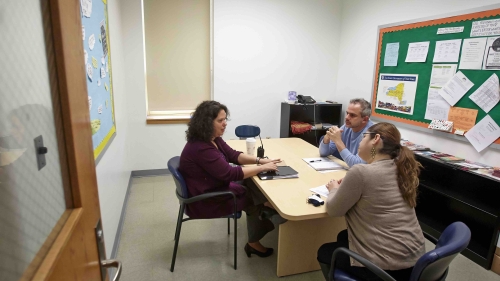

Gary Anderson
Professor Emeritus of Educational Leadership and Policy Studies
Administration, Leadership, and Technology
I am a former middle and high school teacher and high school principal. From 1982-1984 I was a high school principal at the Colegio Americano de Puebla. At the university level I have taught courses in Education policy, educational leadership, qualitative research, action research, discourse analysis, organizational theory, politics of education, teacher development, Education advocacy, and the school principalship.
My research interests are interdisciplinary and range widely. I am particularly interested in doing research within the tensions between theory and practice in applied fields like education. As a result of this interest, I have co-authored two books on Action Research (Anderson, Herr, and Nihlen, 1994; Herr and Anderson, 2015), and have written extensively on issues of knowledge production in applied fields of study.
My most recent work is in the filed of education policy. I am interested in ways educational research might better inform policy and issues of knowledge mobilization generally and particular, how neoliberal and privatization agendas are undermining public education and the notion of "the public sphere" more generally. I have published a study on new governance and new policy networks focused on the education task Force of the American Legislative Exchange Council (ALEC) and am currently working on a study of the State Policy Network and its impact on education policy and the very meaning of being a public sector professional. My 2018 book, The New Democratic Professional: Confronting Markets, Metrics, and Managerialism takes up this issue.
I have published most extensively in the field of Educational Leadership. My work attempts to refocus the field through the use of critical and poststructural theories, particularly Marx, Habermas, Bourdieu, and Foucault. I have also done research on organizational micropolitics, and more recently on school privatization and the impact of global neoliberalism on education. I have an interest in Education in Latin America and have received two Fulbright awards to do research in Argentina and Mexico.
A central concern of my research has been the symbolic dimension of educational leadership and the ways administrators “manage meaning” (ie. dominant discourses) in schools, school districts, and school communities.
My dissertation research was an ethnographic study of school principals in which I developed a model that explored how administrators mediate political demands vertically within the hierarchy as well as horizontally among school professionals and the school community. (Anderson 1989, 1990). This research led me to further research that explored school micropolitics - the behind the scenes struggle for power within the informal organization (Blasé and Anderson, 1995; Anderson, 1991) – and the micropolitics of student behavior as they struggle to form academic identities in socially stratified contexts (Anderson, 1996; Anderson and Herr, 1993; Herr and Anderson, 1993, 1997). Part of this study of student voices compared data gathered in the U.S. with data from a Fullbright research award in Puebla, Mexico. Given the growing Mexican student population in New York (mainly from the state of Puebla) I plan to extend this comparative analysis in the future.
This research has lead me to a concern with how administrative practices within highly unequal and politicized contexts can shift power to students and communities, particularly in low-income communities of color. I have more recently developed a framework for authentic school-community partnerships (Anderson, 1998) and continue to explore forms of school leadership conducive to equalizing opportunities in urban schools. I explore these issues in my latest book, Advocacy Leadership: Toward a Post-Reform Agenda (2009, Routledge).
I have done several studies using discourse analysis of school and policy texts, national standards and licensure exams for administrators, and media accounts (Anderson and Grinberg, 1998; Anderson, 2001a, 2001b, 2004). These studies trace the shifting role of school leaders in the context of “new economy” demands for greater marketization, corporatization and the increasing privatization of public schooling and the public sphere in general.
Selected Publications
- Anderson, G.L. & Cohen, M. (2015). Redesigning the identities of teachers and leaders: A Framework for Studying New Professionalism and Educator Resistance.Education Policy Analysis Archives, 23(91), 1-23.
- Herr, K. and Anderson, G.L. (2015). The action research dissertation: A guide for students and faculty.Thousand Oaks, CA: Sage Pub.
- Anderson, G.L. & Montoro Donchik, L. (2016). The privatization of education and policy-making: The American Legislative Exchange Council and network governance in the United States. Education Policy. 30(2), 322-364.
- Anderson, G.L. (2017). Participatory Action Research as Democratic Disruption: New Public Management and Educational research in Schools and Universities. International Journal of Qualitative Studies in Education. 30(5), 432-449.
- Anderson, G.L., De La Cruz, P., Lopez, A. (2017). New Governance and New Knowledge Brokers: Think Tanks and Universities as boundary organizations. Peabody Journal of Education, 92, 4-15.
- Anderson, G.L. & Lopez Barraza, A. (2017). Reclaiming the global discourse of leadership: From entrepreneurial to advocacy leadership. In D. Waite & I. Bogatch (Eds.) The International Handbook of Educational Leadership. New York: Wiley-Blackwell.
- Anderson, G. & Cohen, M. (2018). The New Democratic Professional: Beyond Markets, Metrics, and Managerialism. New York: Teachers College Press.
- Anderson, G.L. & Chang, E. (2018). Competing Narratives of Leadership in Schools: The Institutional and Discursive Turns in Organizational Theory. In M. Connolly, D.E. Spicer, C. James, S. Kruse (Eds.) Sage International handbook on School Organization. Thousand Oaks, CA: Sage.
- Horsford, S., Scott, J. & Anderson, G.L. (2019). The Politics of Education Policy in an Era of Inequality: Possibilities for Democratic Schooling New York: Routledge
